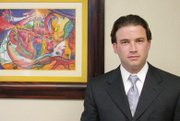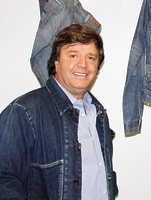Innovo Takes the Fast Track With New Denim Brands
One of the fastest-growing apparel companies in Los Angeles is a relative newcomer to Southern California and the clothing industry. The Innovo Group Inc. has only been in Los Angeles for a little more than two years but already has launched a host of brands. The company started with Joe’s Jeans and then progressed to Shago by Bow Wow and Fetish by Eve. Recently, Innovo signed a licensing agreement to make blue jeans under the Betsey Johnson label.
Amid this activity, the company signed a licensing deal with Candie’s Inc. to make accessories under the Bongo label and another licensing agreement with Mattel Inc. to produce apparel and accessories under the Hot Wheels label. It is also making blue jeans for American Eagle Outfitters and Target Corp.’s Mossimo division, as well as private-label knit tops.
Innovo has grown from an obscure Tennessee accessories company to a force that is determined to establish itself as a Los Angeles apparel powerhouse. The company expects to exceed $100 million in sales this year. Last year, its net sales totaled $83.1 million, but it had a net loss of $8.3 million.
“The company is moving in a lot of different areas. They would like to be the next Jones Apparel [Group],” said J.P. Mark, president of Farmhouse Equity Research in Portsmouth, R.I., who has been following Innovo’s earnings and stock prices.
Marriage between two companies
In 1987, Innovo was launched as an accessories company in Houston by Pat Anderson, who later moved the company to Nashville, Tenn.
Anderson, who serves as the company’s president and runs the accessories division out of Tennessee, ran into some financial problems in the early 1990s after she acquired another small accessories company, Nasco Inc. At the time, Innovo made accessories such as insulated lunch bags and coolers, aprons, and vests for the crafts industry.
The Furrow family of Knoxville, Tenn., watched Innovo’s financial ups and downs from the sidelines. Samuel Jay Furrow Sr. is a major businessman in the area who owns an auction house, a car dealership and several real estate holdings.
Looking for a new business venture, the Furrows in 1998 invested more than $1.8 million in Innovo and relocated the company to Knoxville, where they owned a 65,000-squarefoot manufacturing and distribution facility once used by Levi Strauss & Co. Soon, Samuel Jay Furrow Jr., known as Jay, took over as president, and his father served as chairman of the board.
Even though revenues grew under the Furrows’ leadership, the company was losing money. In 1998, the company had revenues of $6.79 million but had a net loss of $4.04 million. By 1999, revenues had grown to $10.84 million with a net loss of $1.34 million.
“We cleaned the company up for a year and got the hair off, but we essentially were still a small accessory company and losing money,” said Jay Furrow, a lawyer who is now the company’s chief executive officer. “We started looking at two scenarios to address that issue. We had to get out of production. We had our own sewing lines in Knoxville, and it was a nightmare trying to produce domestically our tote bags.... So we were looking for a solution to our production problems. We were also looking for a way to get into the apparel industry.”
That’s when Paul and Hubert Guez, longtime denim manufacturers based in Los Angeles, entered the picture.
The Guez brothers––who own the Commerce Investment Group and Azteca Production International, which opened a denim sewing plant in Puebla, Mexico, in 1998––were looking for ways to keep their new operation busy.
Hubert Guez, after seeing an Innovo press release about a line of denim accessories the Tennessee company was selling to the J.C. Penney Company Inc., promptly called the accessories maker.
“Hubert was looking to partner up with a public company to take advantage of some of the opportunities they had,” Jay Furrow said. “And we were looking for new investors and for someone to take over production and help us get into the apparel business.”
The Guez brothers now own about 25 percent of Innovo’s stock, said Furrow, who moved in 2000 to Los Angeles to concentrate on the apparel end of the business. Innovo officially relocated its headquarters to Commerce, Calif., in 2002. It shares a building with Azteca Production.
Beginning with Joe’s
Innovo started producing accessories in Mexico and partnered in 2001 with the Guez brothers on their first major apparel venture, the creation of the Joe’s Jeans line. The line was named for the line’s head designer, Joe Dahan, who had been designing jeans for the Guez brothers since 1996.
The high-end jeans, made in Los Angeles and designed for men and women, retail for $128 to $143 at stores such as Barneys, Nordstrom Inc. and The Neiman Marcus Group Inc. The line grew from $1.52 million in sales in 2001 to $11.5 million in 2003, adding items such as knit tops and jackets and skirts.
With gross profit margins of about 36 percent last year and 51 percent in 2002, Joe’s Jeans is a lucrative business that Innovo wants to continue. But it has lots of competition from labels such as Seven for All Mankind and Citizens of Humanity.
Growing pains
Innovo knew it had to diversify its portfolio to grow. In 2002, with the help of Danny Guez, Paul Guez’s son, Innovo signed a deal with teen hip-hop singer Bow Wow to produce apparel under the Shago by Bow Wow label. The boys’ and teens’ casualwear line, whose jeans sell for $90 to $100, launched in 2003.
But that venture has not been as successful as Joe’s Jeans.
“Shago started out well, but it had a disappointing fourth quarter last year,” said Mark, who recently downgraded Innovo’s stock from “strong buy” to “buy” status. “It was fairly high-priced and had a small market.”
Innovo is repositioning the label, Furrow said, to lower the price and sell the apparel to mid-tier department stores.
Innovo has been more successful with its 2003 deal with hip-hop diva and actress Eve, who has a television show called “Eve” on the UPN network. Among much fanfare and publicity, the Fetish line started delivery to stores last fall.
“The Eve brand is doing fairly well,” said one Los Angeles financial analyst who follows the juniors market. “It is carried by Pacific Sunwear’s d.e.m.o. stores, and in a conference call, PacSun said they were seeing some success with Fetish.”
However, the line ran into trouble during the Holiday season, when deliveries from overseas, primarily Asia, arrived late and the quality of goods was not up to par.
“That resulted in about only 25 percent of our expectation being met,” Jay Furrow said. “We had some canceled orders and returns. It was really a bad delivery for us.”
The company, writing off much of the Shago and Fetish inventory, had a $5.8 million net loss during the fourth quarter of 2003.
To make sure that does not happen again, the company recently promoted Pierre Levy, a former chief operating officer for Azteca Production, to head of Innovo’s apparel operations.
Paul Guez predicts the Fetish label will resolve its production problems and bring in $25 million in revenues this year.
In the last nine years, Innovo has had only one profitable year—2002, in which the company earned a net profit of $572,000. But company executives are optimistic that the business’s finances will turn around.
“As fast as we grew, there are always going to be growing pains,” Furrow said. “I think we are on a trajectory to exceed $100 million in revenues and make money by the end of the year.”























